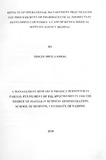| dc.description.abstract | Procurement of drugs and medical supplies is one of the most critical facets in the access and coverage of primary health care. Anti malarials, anti retroviral (ARVs), and therapeautic drugs are constantly needed in developing countries and Kenya is not an exception, yet we experience drug stock outs, expired drugs on the shelf, poor procurement procedures and even counterfeit drugs in the market. This is what this
,
project sort to unfold. Upon discovery is that, amidst this unlimited need for drugs, conflicts of interests arise from the manufacturers who invent new supplies and medicines to the market to counter the rising demand and sudden rise in vast diagnoses. At the same time suppliers of these drugs seek market approval in order to expand sales and their market share, this competition though may be healthy on one side but disadvantageous on the other especially when Key hospitals in the country run stock outs on critical drugs like anti malarials and Arvs.
The rise of counterfeited drugs in the pharmaceutical industry is also cause for alarm and leads one to question whether there exists a bureau of standards to streamline quality assurance procedures? Whether there exists an essential medicine list and adherence levels to it? What popular promotion mode is used and if it is inline with the pharmaceutical promotional code of ethics?
This project based itself on the 4 WHO (World Health Organization) operational principles of pharmaceutical management namely efficiency and transparency, drug quantification, procurement, promotion and supplier selection. It is on the above principles that the project sought to examine the managerial implementation on the pharmaceutical products industry. Based on the above, the main objective of this project was to establish the impact of operational management practices on the procurement of pharmaceutical products in developing countries.
In this case the practices are the principle framework recommended by the WHO above. The study sought to particularly use a case of KEMSA (Kenya Medical Supplies Agency) which drew a significant representation of drug procurement in a number of developing countries. Particularly procurement methods and key supplier policies on TB (Tuberculosis) drugs, ARVs and Antimalarials played a critical role in the sample determination and analysis thereafter. The document further discusses the options of procurement processes and policies that should be considered when implementing or reforming access to the drugs and medical supplies in question, which is key information to drug manufacturers, suppliers, competitors and even policy makers.
An empirical analysis was carried out surveying various Kemsa's key respondents to establish opinions on effective procurement, promotion, efficiency, drug quantification, and supplier selection management. Based on a basic Cobb Douglas function that the project formulated, correlation models and coefficients were drawn to identify relationships and extents of managerial adherence to pharmaceutical procurement principles. Two operational principles appeared to have drawbacks on the management perspective: drug quantification and supplier selection, procurement (irregular supply chain management).
The project concluded on one major mechanism that would prove remedial to the managerial inefficiencies in the principles above is decentralization. Whereby management of drugs and supply chain logistics is contained within the facility such that it does its own quantification and supplier selection as per the needs of that particular locality. This will eradicate loopholes in health care access and coverage such as essential drug stock outs, and undeserved supplier selection hence saving lives. | en_US |

